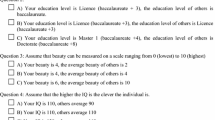Abstract
This paper uses survey data to provide empirical evidence regarding the importance of positional concerns in different domains and their determinants. In the survey, respondents are asked to choose between a world in which they have more of a good than others and a world in which their endowment along with everyone else is greatly improved, but they have less than others. Our results lend support to the claim that positional concerns play a crucial role in the decision-making process of individuals, though they appear to be more influential in some domains than others. Moreover, empirical results point out relationships between the age, gender, education, and income level of the respondents and their positional concerns in different domains.
Similar content being viewed by others
References
Alpizar, F., Carlsson, F., & Johansson-Stenman, O. (2005). How much do we care about absolute versus relative income and consumption? Journal of Economic Behavior & Organization, 56(3), 405–421.
Besharov, G. (2002). Three questions about the economics of relative position: A response to Frank and Sunstein. Boston University Law Review, 82, 1241–1261.
Boskin, M. J., & Sheshinski, E. (1978). Optimal redistributive taxation when individual welfare depends upon relative income. Quarterly Journal of Economics, 92, 589–601.
Bougherara, D., Costa, S., Grolleau, G., & Ibanez, L. (2010). Can positional concerns enhance the private provision of public goods? Working Papers, LAMETA, University of Montpellier.
Carlsson, F., Johansson-Stenman, O., & Martinsson, P. (2007). Do you enjoy having more than others? Survey evidence of positional goods. Economica, 74, 586–598.
Cole, H. L., Mailath, G. J., & Postlewaite, A. (1992). Social norms, savings behavior, and growth. Journal of Political Economy, 100(6), 1092–1125.
Dawes, R. M. (1980). Social dilemmas. Annual Review of Psychology, 31(1), 169–193.
Duesenberry, J. S. (1948). Income—consumption relations and their implications. In L. A. Metzler et al. (Eds.), Income, employment and public policy: Essays in honor of Alvin Hansen (pp. 45–81). New York: W. W. Norton & Company.
Duesenberry, J. S. (1949). Income, savings, and the theory of consumer behavior. Cambridge, Mass.: Harvard University Press.
Easterlin, R. (1974). Does economic growth improve the human lot? Some empirical evidence. In P. David & M. Reder (Eds.), Nations and households in economic growth: Essays in honor of Moses Abramovitz (pp. 89–125). New York: Academic Press.
Easterlin, R. (1995). Will raising the incomes of all increase the happiness of all? Journal of Economic Behavior & Organization, 27, 35–47.
Eckel, C. C., & Grossman, P. J. (1998). Are women less selfish than men?: Evidence from dictator experiments. The Economic Journal, 108(448), 726–735.
Frank, R. H. (1985a). Choosing the right pond: Human behavior and the quest for status. New York: Oxford University Press.
Frank, R. H. (1985b). The demand for unobservable and other nonpositional goods. American Economic Review, 75, 101–116.
Frank, R. H. (1997). The frame of reference as a public good. Economic Journal, 107(445), 1832–1847.
Frank, R. H. (1999). Luxury fever: Money and happiness in an era of excess. New York: The Free Press.
Frank, R. H. (2005). Positional externalities cause large and preventable welfare losses. American Economic Review, 95(2), 137–141.
Frank, R. H. (2007). Falling behind: How rising inequality harms the middle class. University of California Press.
Frank, R. H. (2011). The Darwin economy: Liberty, competition, and the common good. Princeton: Princeton University Press.
Frank, R. H., Levine, A. S., & Dijk, O. (2014). Expenditure cascades. Review of Behavioral Economics, 1(1–2), 55–73.
Frank, R. H., & Sunstein, C. R. (2001). Cost-benefit analysis and relative position. University of Chicago Law Review, 68(2), 323–375.
Galbraith, J. K. (1958). The affluent society. Boston: Houghton Mifflin.
Hardin, G. (1968). The tragedy of the commons. Science, 162(3859), 1243–1248.
Hirsch, F. (1976). Social limits to growth. Cambridge MA: Harvard University Press.
İlkkaracan, I., & Selim, R. (2007). The gender wage gap in the Turkish labor market. Labour, 21, 563–593.
Ireland, N. J. (2001). Optimal income tax in the presence of status effects. Journal of Public Economics, 81, 193–212.
Marx, K. (1849/1969). Wage labour and capital, in (K. Marx & F. Engels), Selected Works Vol.1. Moscow: Progress Publishers.
Mill, J. S. (1848/1909). Principles of political economy: With some of their applications to social philosophy. London: Longmans, Green.
Neumark, D., & Postlewaite, A. (1998). Relative income concerns and the rise in married women’s employment. Journal of Public Economics, 70, 157–183.
Olson, M. (1965). The logic of collective action: Public goods and the theory of groups. Cambridge: Harvard University Press.
Schelling, T. C. (1978). Micromotives and macrobehavior. New York: W. W. Norton & Co.
Schor, J. (1998). Work, free time and consumption. Time and Society, 7(1), 119–127.
Smith, A. (1776/1937). An inquiry into the nature and causes of the wealth of nations. New York: Random House.
Solnick, S. J., & Hemenway, D. (1998). Is more always better?: A survey on positional concerns. Journal of Economic Behavior & Organization, 37, 373–383.
Solnick, S. J., & Hemenway, D. (2005). Are positional concerns stronger in some domains than in others? American Economic Review, 95(2), 147–151.
Solnick, S. J., Hong, L., & Hemenway, D. (2007). Positional goods in the United States and China. The Journal of Socio-Economics, 36(4), 537–545.
Tversky, A., & Griffın, D. (1991). Endowment and contrast in judgments of well-being. In F. Strack, M. Argyle, & N. Schwartz (Eds.), Subjective well-being: An interdisciplinary perspective (Vol. 21, pp. 101–118). Oxford: Pergamon Press.
Veblen,T. (1899/1912). The theory of the leisure class: An economic study of institutions. New York: Macmillan.
Zeckhauser, R. J. (1991). The strategy of choice. In R. J. Zeckhauser (Ed.), Strategy and Choice (pp. 1–21). Cambridge, MA.: MIT Press.
Author information
Authors and Affiliations
Corresponding author
Rights and permissions
About this article
Cite this article
Birdal, M., Ongan, T.H. Why Do We Care About Having More than Others? Socioeconomic Determinants of Positional Concerns in Different Domains. Soc Indic Res 126, 727–738 (2016). https://doi.org/10.1007/s11205-015-0914-9
Accepted:
Published:
Issue Date:
DOI: https://doi.org/10.1007/s11205-015-0914-9




